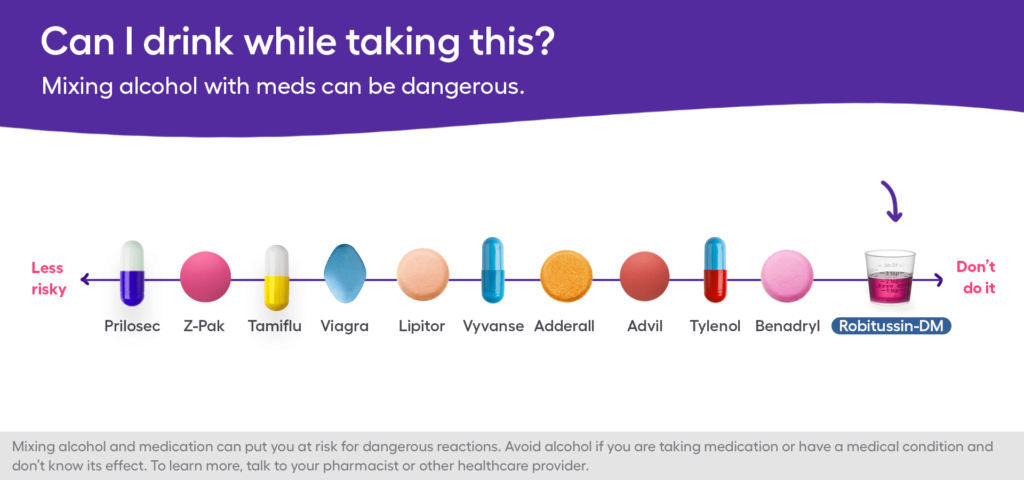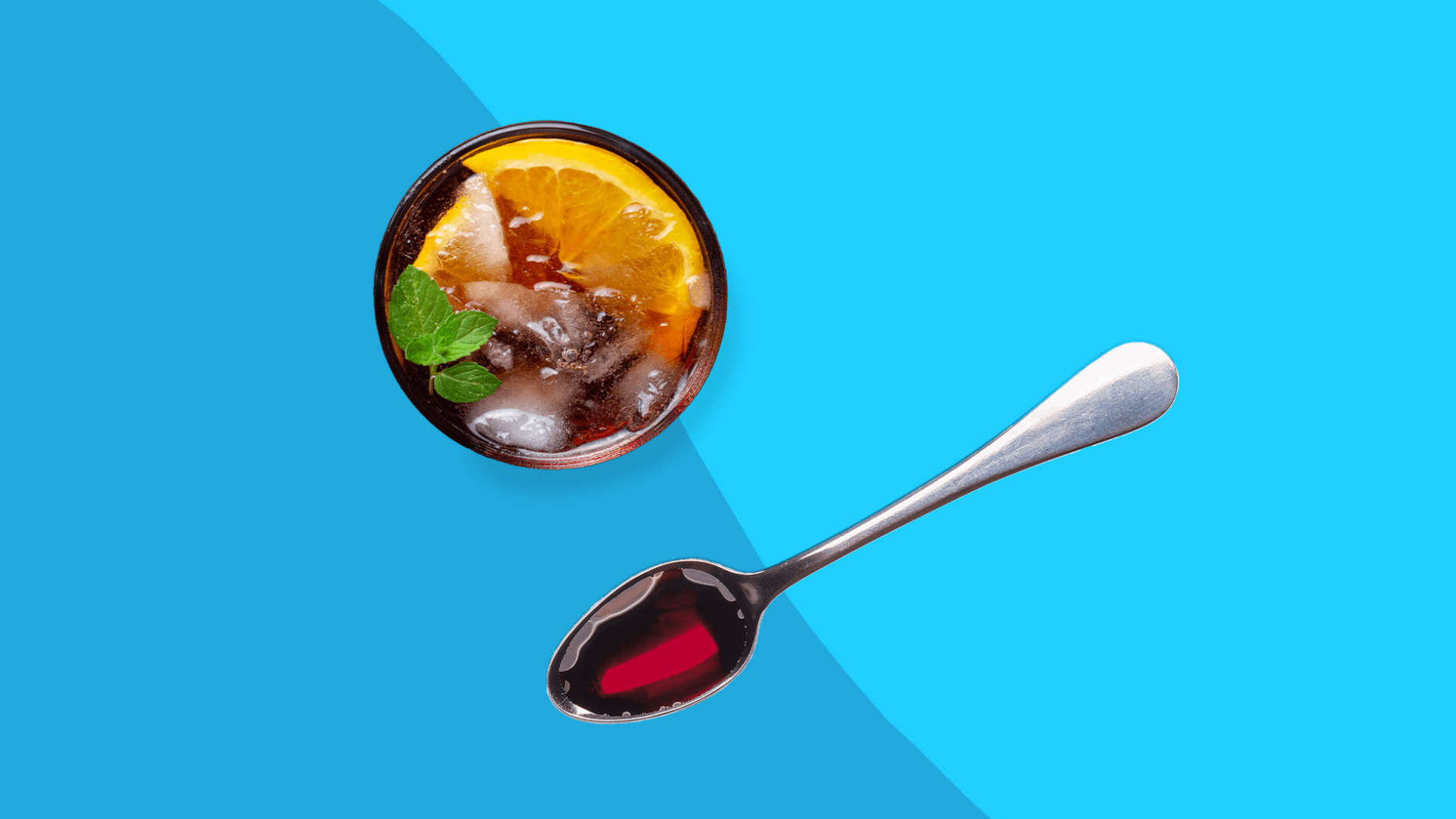A cough can be anything from a minor annoyance to severe misery, keeping you up at all hours of the night. When you have a cold with a pesky cough, you may reach for a bottle of over-the-counter (OTC) cough syrup. If you’ve seen your doctor for your illness, he or she may even prescribe a stronger cough preparation.
So, what if you want to enjoy a glass of wine with dinner or a beer during the football game? Can you mix cough syrup and alcohol?
Unfortunately, alcohol and cough syrup do not mix. Combining cough syrup and alcohol can lead to increased dizziness and drowsiness and impair your coordination and driving. Some cough medications contain alcohol as well, so the effects can be even more severe. Continue reading to learn more about interactions between common cough syrups and alcohol.
Common cough syrups and their ingredients
First, let’s break down some of the most common over-the-counter (OTC) and prescription cough medicines and their ingredients that relieve coughing.
OTC:
- Robitussin DM, Tussin DM (contains guaifenesin, an expectorant, and dextromethorphan, a cough suppressant)
- Delsym (contains dextromethorphan)
- NyQuil syrup (contains dextromethorphan along with several other ingredients)
- DayQuil syrup (contains dextromethorphan along with several other ingredients)
- Mucinex-DM liquid (contains guaifenesin and dextromethorphan)
- Note: Many other cough and cold preparations (in pill or syrup form) also contain dextromethorphan, such as NyQuil Liquicaps, DayQuil Liquicaps, Robitussin cough gels, and Mucinex-DM tablets.
Prescription:
- Phenergan DM (contains promethazine and dextromethorphan)
- Phenergan with codeine (contains promethazine and codeine)
- Robitussin AC (contains guaifenesin and codeine)
- Tussionex (contains chlorpheniramine and hydrocodone)
As you can see above, the most common ingredients for coughs are dextromethorphan and codeine.
Can you mix dextromethorphan and alcohol?
What happens if you are taking an OTC or prescription cough medicine that contains the cough suppressant dextromethorphan—can you mix that Robitussin-DM and alcohol? Or Delsym and alcohol? Or any other product that contains dextromethorphan with alcohol?
Nope. Even though you can readily find products containing dextromethorphan OTC, these medicines can be very dangerous when mixed with alcohol.
Why is that? Well, dextromethorphan and alcohol are both central nervous system (CNS) depressants, which means they cause relaxation, sleepiness, and a euphoric feeling. Dextromethorphan, on its own, is a widely abused drug. And mixing dextromethorphan and alcohol causes additive side effects, which can increase the risk of overdose. Some effects this combination can cause include:
- Respiratory depression (slowed breathing)
- Out-of-body feeling
- Brain lesions that can cause memory and behavior problems
- Epilepsy
- Permanent psychosis

What about guaifenesin?
Guaifenesin is an expectorant, which helps loosen mucus. Many people use this medicine to help break up a “phlegmy” cough. Guaifenesin is found in OTC products such as Mucinex or plain Robitussin (not Mucinex-DM or Robitussin-DM—the DM stands for dextromethorphan in these products). Some prescription products, such as Robitussin with codeine, also contain guaifenesin.
Although guaifenesin technically does not interact with alcohol, it is still better to skip the alcohol while sick. Alcohol can cause symptoms of the illness (and side effects of your medicines) to worsen. Alcohol can also make you dehydrated and weaken your immune system.
Can you mix codeine cough syrup and alcohol?
Let’s say your cough is so severe that you skipped the OTC aisle and went straight to your doctor, who prescribed a cough syrup that contains hydrocodone or codeine. Can you mix a hydrocodone or codeine cough syrup and alcohol?
Narcotic medications such as hydrocodone or codeine contain a black box warning, which is the strongest warning required by the United States Food and Drug Administration (FDA). These drugs have a high potential for abuse and dependence when taken on their own, leading to overdose and death. Cough syrups that contain narcotics are controlled substances and should be selectively prescribed to carefully screened adults where the benefits outweigh the risks. When taken on their own, these codeine-containing cough syrups can also lead to serious, life-threatening, or fatal respiratory depression.
Now, add in alcohol? That’s a big no. The manufacturers of these cough syrups warn (also in the black box warning) that combining opioids such as codeine or hydrocodone with alcohol can cause “profound sedation, respiratory depression, coma, and death.” Hydrocodone- or codeine-containing cough syrup plus alcohol equals a prescription for disaster.
Also, some OTC and prescription cough medicines, in addition to their cough suppressant ingredients, contain a small amount of alcohol. So now you’d be combining all the effects of the medication with alcohol and more alcohol.
Which cough syrups contain alcohol?
Some common cough syrups that contain alcohol include some formulations of NyQuil, ZzzQuil, and other nighttime cough or cough/cold syrups, among others. When in doubt, ask your pharmacist.
Which cough syrups do not contain alcohol?
Better yet, choose an alcohol-free formulation. Most pharmacies carry a few types of alcohol-free cough syrups, such as alcohol-free Tussin-DM or Safe-Tussin DM. If you want to avoid alcohol in your glass and your medication, choose one of these options.
However, as formulations may change over the years, it’s prudent to check the label with your pharmacist when selecting an OTC cough medicine to make sure there is no alcohol in the product.
If I drink alcohol, what can I take to treat my cough?
The bad news: It’s best to avoid alcohol for a few days until you feel better. Most cough medicine and alcohol have the potential to interact, and some interactions can be deadly.
The good news: You may recover faster if you don’t drink while you are sick. Alcohol can interfere with your sleep, and when you are sick, you need your z’s. An excessive amount of alcohol can even work against your immune system.
So, avoid alcohol and take your cough medication. Or, if you know you’ll be drinking alcohol, try some drug-free ways to treat your cough. A spoonful of honey, some non-medicated cough drops, a humidifier or vaporizer, and plenty of fluids just might do.
The bottom line
When you’re recovering from an illness and taking cough syrup, skip the alcohol. You’ll have plenty of time to celebrate when you feel better.











